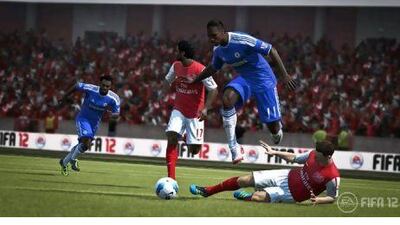A message from a corporate executive isn't the sort of thing you'd expect to go viral. But shortly after Peter Moore, the sports director for video-game titans EA Sports, stood in front of the camera in June of this year, the internet went into overdrive, particularly across the Middle East. The fact that he had begun his message with "assalaam aleikum" was an indicator that something special was being announced.
And then it came. The next edition of FIFA - FIFA 12, due out this week - in the enormously popular, multimillion-copy selling video-game franchise, was, for the very first time, going to feature Arabic as a language option. Best of all, it wouldn't just see menu screens translated, but would come with actual Arabic commentary during the matches. Arabic FIFA fans, for so long having had to cope with the dulcet tones of British commentators talking over their favourite video game (this year has Alan Smith and Martin Tyler doing the honours), would finally have something especially for them. And when the names were revealed - commentating legends Issam Chaouali from Tunisia and Saudi's Abdullah Al Harbi - the excitement went up a notch.
Peter Moore's online message has been viewed more than 45,000 times on EA's local YouTube channel alone, and subsequent videos showing the commentators in action have gathered even more hits. Such was the interest surrounding the announcement that the servers of the Saudi website www.true-gaming.com crashed due to the amount of traffic.
The idea to produce an Arabised version of FIFA had been milling around for some time, but it was only a year ago when the wheels were finally put into motion. "The Arab-speaking world is a very big market for us," says EA's marketing manager developing territories, Nikos Maniatis. "We brainstormed what else we could do for consumers in this territory, and having the game localised was the best idea."
The recording took place in Doha, where both Chaouali and Al Harbi are based, and took two months of exhausting work in between their day-to-day commentary work. "It involved something around 140 hours of recording," says Rafed Salem, the localisation manager of the game's regional distributor Red Entertainment, who was working with the two commentators throughout. "It was around 70 hours each. We ended up translating around half a million words."
But rather than just translate the English commentary, with Chaouali and Al Harbi simply copying the same phrases and expressions, the aim was to make the Arabic version sound like the real thing. "It was important to give the commentators the freedom to act as themselves," says Salem. "In some cases, we had to scrap the script so they could match the way they acted at specific actions. It was this way we could make it like live TV."
Understandably, with this being the first to feature Arabic commentary, there were difficulties. One such problem was dialect, which differs across the Arab-speaking world. "We kept the translations informal, and let the commentators do it in their own way, their own style, their own dialect. We had to change a lot of that to make it compatible across the region."
Thankfully, such is the calibre and status of Chaouali and Al Harbi that many football fans across the region already recognise and understand their distinct styles, irrespective of dialect. Also, with the two having already worked for several years together, using them both on FIFA 12 only added to the realism.
"We were very lucky when we were looking to find the best commentators in the region to be the voices of the game," says Salem. "We wanted people who would be familiar to everybody, but also have the harmony because they were going to be working together for several months. When you hear Chaouali and Al Harbi in the game you can feel the harmony between them. It feels as if they're doing it normally."
And, as in real life, Chaouali takes the role of main commentator during the game while Al Harbi provides the analysis on the side.
"It was harder to record in a closed studio compared with live commentary where we can see the match played in front of us," says Chaouali. "In video-game recording you need to imagine the actions and provide your best commentary to match what's happening in the game."
However, the Tunisian commentator did admit that in making the video game, things were much more flexible. "We were able to do lots of things by re-recording some of the scripts when we found something that could be changed to a better term."
Hopes are high for FIFA 12 across the region. Such is the anticipation that when a work-in-progress video was posted on EA's regional Facebook page two days ago, within minutes it had been inundated with comments poring over every aspect of the commentary.
The next obvious step for local FIFA fans would be for a fully Arabic version, featuring regional leagues and the opportunity to control teams such as Egypt's Al-Ahly or even perhaps to take over Diego Maradona's job at Al Wasl.
"I think all will depend on the success of this game," says EA's Nikos Maniatis.
The dual English and Arabic version of FIFA 12 is available to buy now on PS3 and Xbox 360. This version will feature a yellow sticker on the cover.

